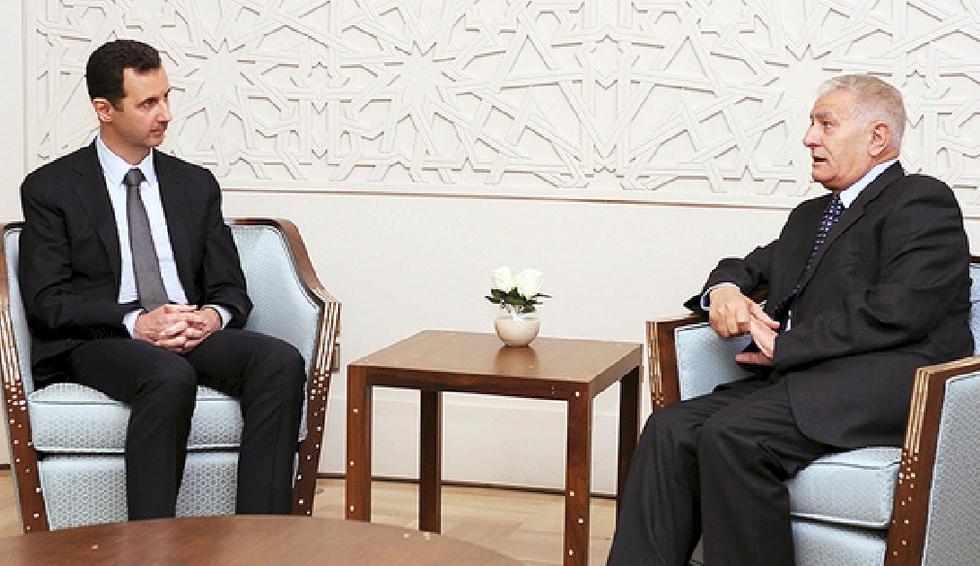Why is Fatah re-establishing ties with Syria's Assad?

The decision by the West-Bank based Palestinian movement Fatah to officially re-establish ties with the Syrian government following three decades of animosity has raised questions by observers with regards to the real motive behind the reconciliation bid.
Earlier this month, a member of Fatah's central committee, Abbas Zaki, said that the Palestinian movement will soon be opening offices in Damascus to establish "legitimate relations".
Following a trip made by Zaki to the Syrian capital, the Palestinian official said the meeting with representatives of President Bashar al-Assad was "successful".
Relations between Fatah and Assad have been improving since the April infiltration of militants from the Islamic State (IS) into the Yarmouk refugee camp in Damascus, which was under a tight government siege since 2012.
Zaki praised the recent Syrian government bombing of the camp, likening it to a "treatment of a doctor seeking to take out the stale part of a body".
Prior to the IS invasion, the camp was predominately under the control of Syrian rebels and armed Palestinian groups critical of Assad. However, pro-Assad Palestinian militants, namely the Liberation of Palestine – General Command (PFLP-GC), had run the camp before 2012.
Zaki said an agreement was reached to allow food into the besieged Yarmouk, adding that two-thirds of the camp remain under IS control.
Zaki has reportedly discussed with the Syrian government the fate of Palestinians imprisoned in Syrian jails, in an apparent mediation effort, while also adopting Assad's narrative that of the fight against "terror".
Prior to Zaki's visit, Fatah member Moussa al-Safdi announced that the Palestine Liberation Organisation (PLO) supports any decision made by Assad's government in Yarmouk as it sees it as a Syrian issue.
Safdi said there have been official communication channels between the PLO and the Syrian government via the Palestinian ambassador in Damascus, Mahmoud al-Khalidi, and the representative of Fatah in Syria, Samir al-Rifai.
'Accepted by Israel'
On the face of it, the move appeared to be a departure from the bitter ties between the two sides.
The Syrian government had systematically targeted PLO members and their families in Lebanon, most notably during the 70s, when on one occasion Christian militias destroyed the Tel al-Zaatar Palestinian refugee camp – home to some 50,000 people - with the backing of former Syrian President Hafez al-Assad.
In fact, according to US diplomatic cables from 1978 recently released by WikiLeaks, the "Syrian involvement in Lebanon was largely accepted by Israel, due to Syria's attempt to curb the power of the PLO," wrote Imogen Lambert.
Some observers have attributed the reason behind Fatah's move to an attempt by the movement to portray itself as the party that can aid Palestinians in distress, but in the process it has given undue credit to the Syrian government.
"Long before the entrance of IS [into the camp], Palestinians were besieged, starved and bombed by the Syrian regime," Sharif Nashashibi, a Middle East analyst, told MEE.
"But in attempting to big up its own role, Fatah has allowed Assad to cynically use the situation to again present himself as the champion of the Palestinian cause," Nashashibi added.
Nashashibi also noted that Fatah may also be seeking to strengthen its influence inside the camp, which – until the IS offensive – had been dominated by the Palestinian group Aknaf Bait al-Maqdis, which is known to be sympathetic to Hamas.
However, other analysts suggested that Fatah may also be competing with the influence of leftist Palestinian groups in the camp, who are viewed as Assad's enforcers inside Yarmouk.
"Fatah is also a rival to the PFLP-GC, which is powerful in Syria," a West Bank-based Palestinian observer, told MEE on condition of anonymity.
'Scoring points'
Meanwhile, Abd Alsattar Qasim, Professor at Bier Ziet University in the West Bank, believes that the purpose of the visit is to deal a symbolic blow to Hamas in Gaza, and has little to do with politics in Syria.
"It's a question of scoring points to get back at rivals. As Hamas was accused of backing the [Syrian] opposition, Fatah felt it must back the other side, i.e. the regime of [President Bashar] al-Assad," Qasim told MEE.
Qasim underscored the irony of such re-establishing of ties.
"The PLO has been at odds with the Syrian regime for many years. Abu Ammar [the late Palestinian President Yasser Arafat] had described the Syrian regime as 'the Zionists of the Arabs'.
"At the outset of the Syrian crisis, Fatah had criticised the General Command (PFLP-GC) for backing the [Assad] regime. But now has changed its stance."
But Qasim stressed that the move is not a "new strategy by the PLO".
"The decision would not be appreciated by Saudi Arabia, which backs the PA financially," he noted.
"I don't think that relations between the PA and the Syrian regime will actually improve. They will remain cool. The PA will continue to please the Saudis so that money will continue to flow."
New MEE newsletter: Jerusalem Dispatch
Sign up to get the latest insights and analysis on Israel-Palestine, alongside Turkey Unpacked and other MEE newsletters
Middle East Eye delivers independent and unrivalled coverage and analysis of the Middle East, North Africa and beyond. To learn more about republishing this content and the associated fees, please fill out this form. More about MEE can be found here.




